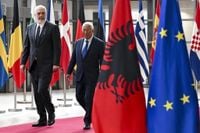On April 14, 2025, a significant milestone was reached in the European Union's efforts to expand its influence in the Western Balkans. President António Costa of the European Council welcomed Albanian Prime Minister Edi Rama in Brussels, where they announced the opening of a new negotiation cluster focused on the internal market. This development marks an important step in Albania's journey toward EU accession, reflecting the EU's commitment to the region's stability and prosperity.
During their meeting, Costa emphasized that enlargement to the Western Balkans is a "clear political priority for the European Union, it is our real commitment with the region, and it is the most important geopolitical investment – for peace, for prosperity, and for stability on our continent." The opening of this cluster is significant not only for Albania but also for the broader region, as it signals the EU's determination to integrate the Western Balkans into its political and economic framework.
Prime Minister Rama expressed his gratitude for the EU's support and highlighted the progress Albania has made in its accession path. "Today is a very good day for us because we have another conference and open other chapters," said Rama. He confirmed Albania's commitment to meet the ambitious timeline set for concluding negotiations by 2027. This target aligns with the EU's broader plan for a new wave of enlargement set for 2030, which includes the Western Balkans.
As part of the discussions, the two leaders addressed the opening of nine chapters related to the internal market, covering essential areas such as the free movement of goods, freedom of movement of workers, and corporate law. This comprehensive approach aims to align Albania's market structures with those of the EU, facilitating smoother integration.
In recent months, Albania has made significant strides in its negotiations, opening 16 chapters since the European Commission separated its accession path from that of North Macedonia. This has allowed Albania to focus on critical areas such as Judiciary and Fundamental Rights, Justice, Freedom and Security, and alignment with EU foreign and security policy.
While Montenegro has been ahead in the negotiation process, having opened 33 out of 35 chapters, Albania's rapid progress is noteworthy. EU Commissioner for Enlargement Marta Kos has indicated that both Albania and Montenegro have realistic prospects of concluding their negotiations between 2026 and 2027, a timeline that many see as ambitious yet attainable.
To further emphasize the EU's commitment to the region, Costa announced plans to visit all six Western Balkan countries in mid-May 2025. This visit aims to enhance cooperation and promote a unified approach to the accession process. It will also serve as a precursor to the upcoming European Political Community summit scheduled for May 16 in Tirana, which is expected to address various regional issues and strengthen ties between the EU and its neighbors.
Rama's leadership in these negotiations has been pivotal, as he has consistently advocated for Albania's integration into the EU. He stated, "There are many things to discuss, but overall, I am very encouraged by these developments and really committed to meeting all the commitments in the timetable to conclude negotiations by 2027." His optimism reflects a broader sentiment in Albania, where the public and political leaders alike are eager for the benefits that EU membership would bring.
However, the path to accession is not without its challenges. The EU has been cautious in its approach, ensuring that candidate countries meet specific criteria before granting membership. This merit-based process means that while Albania and Montenegro are making progress, other countries in the region, such as Serbia, Bosnia and Herzegovina, and North Macedonia, are lagging behind. Issues such as political instability and slow reform processes have hindered their progress.
In Serbia, for instance, President Aleksandar Vučić faces mounting domestic challenges, including mass protests against his government. His administration's flirtation with Moscow and Beijing has further complicated Serbia's EU aspirations, as the EU seeks alignment with its foreign and security policies from all candidate countries.
In contrast, Albania's proactive stance and commitment to reforms have positioned it favorably in the eyes of EU leaders. The recent opening of negotiation chapters is a testament to this progress, as is the positive feedback from EU officials regarding Albania's reform efforts.
The upcoming European Political Community summit in Tirana is expected to serve as a platform for discussing not only Albania's accession but also broader regional stability and cooperation. Costa's visit to the region will underscore the EU's commitment to fostering peace and prosperity in the Balkans.
As the EU continues to navigate the complexities of enlargement, the focus remains on ensuring that all candidate countries are prepared for membership. For Albania, the recent developments represent a hopeful chapter in its quest for EU integration, with leaders on both sides expressing optimism about the future.
With the ambitious goal of concluding negotiations by 2027, Albania is poised to be a key player in the EU's expansion efforts. The commitment shown by both Costa and Rama reflects a shared vision for a more integrated and stable Europe, one that includes the Western Balkans as a vital part of its future.




